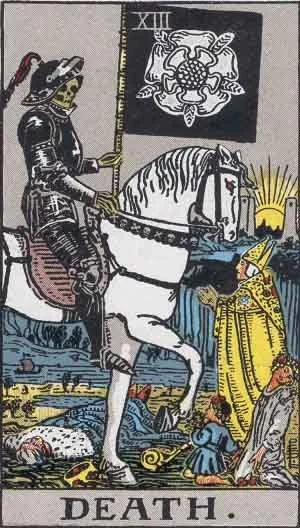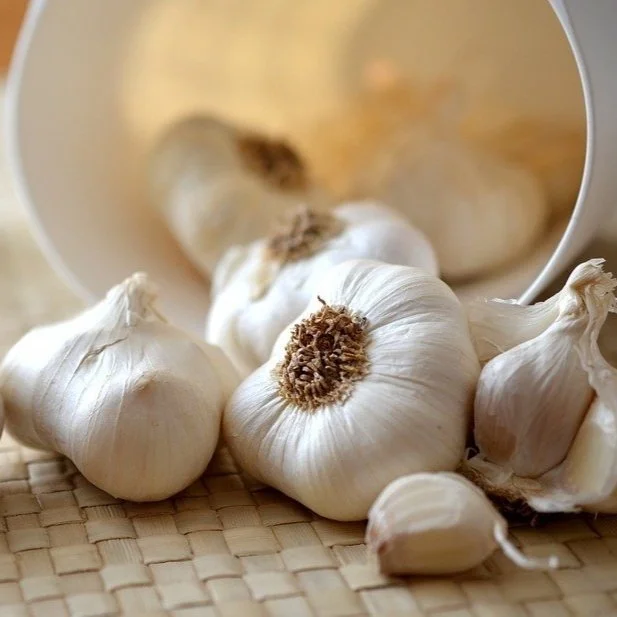The Meaning of Samhain / The Witch’s New Year
You’re in the right place if you want to…
learn about the wheel of the year and how the Sabbats come into play
understand the history of Samhain and it’s importance in other cultures
discover some fun and serious ways to celebrate the Sabbat
Subscribe here to be notified about new episodes.
To start off the show, we look at our Tarot Card for the week and we look for moments that relate to this card in our daily lives.
For this episode we have a first for our show, we chose the Death card which is a Major Arcana card. While the numbered minor arcana—or the pips—are about day to day events, and the court cards are the cast of characters, the major arcana are the keynote or lesson of the story in your reading. The theme of the death card is unsurprisingly death and also transformation.
The death card can be scary when it comes up. Pop culture has added a banality to the card. When it shows up in movies or TV, the mystical fortune teller character dramatically declares that someone will die! So, to push back on that, many of us who teach Tarot teach a mellower version, that the Death card is about transformation and change, and it’s actually a good card and it’s not scary.
Honestly, it can be both. Death can mean literal physical death or metaphorical death. Whichever it is, it speaks to an event that precipitates an earth-shattering change in your reality. It’s hard because I don’t want people to freak out when they see this card in a reading. There is so much potential after the “death”. It is an opportunity to shed our skin like a Scorpion and emerge bigger and better than ever. We can rise like a phoenix from the ashes of our death. So we often focus on the “after” during a reading to sort of soften the blow. But in someways this is bypassing the grief that comes from the “death”.
We tend to focus on those opportunities, the bright side, to make it not seem so bad, but the “death” is also about grieving the loss. You can’t move forward without properly processing the grief.
You can hear Erica’s and Maggie’s stories related to Death by listening to the episode.
Wheel of the Year
Before we get into Samhain, we’ll give you some background about the Wheel of the Year. This is a way to recognize the important turning points in nature’s annual journey through the seasons. I love the wheel of the year, because it reminds me to reconnect with the natural world and the fluctuating energy of the sun.
Much of this cyclical calendar is based on the agricultural timing of planting crops in spring, watching them grow in summer, harvesting in the fall, and resting and preparing in the winter. Many of us modern people who are not farmers, don’t necessarily need to be preoccupied with the agricultural calendar. However, there is something to be said for aligning with these themes throughout the year.
Solar Holidays
There are four solar holidays. This just means they are related to the position of the sun and the dates of these holidays differ slightly from year to year. The solar festivals are the Spring Equinox (Ostara), Summer Solstice (Litha), Fall Equinox (Mabon) and Winter Solstice (Yule).
Fire Festivals
The other four sabbats are known as fire festivals. They are Imbolc, Beltane, Lughnasadh and Samhain.
We’ll be focusing on Samhain today because this date is approaching in the Northern Hemisphere. For any southern hemisphere listeners, this would be Beltane.
This Sabbat marks the mid-point between the fall equinox (Mabon) and the winter solstice (Yule) and it is the final harvest after Lughnasadh and Mabon, though there is usually very little left to harvest depending on where you live in the world.
Mabon is often considered the first day of fall but in the past, Lughnasadh would have been the first day of the harvest season or fall. The word Samhain is translated as “summer’s end,” which would make it the first day of winter. Most modern calendars tell us that’s Yule.
Samhain (SOW-win) Stories
Samhain is what many people in the modern world have come to call Halloween, and while the way most people celebrate Halloween comes from traditions that originated with Samhain, Samhain is much more meaningful to the witches and pagans who celebrate it than the commercialized halloween celebration. Halloween could be considered half of the overall celebration of Samhain.
Halloween is focused on costumes, revelry, and social interaction. These are certainly important parts of Samhain, after all, in Scorpio season we are invited to explore some taboos of polite society as we discussed in the episode last week. Samhain is also about communicating with the spirit realm.
At Samhain, the veil between the realms is the thinnest meaning, spirit realm entities—like fairies, spirits, and ancestors—can visit the physical realm more freely than they do at other times of the year.
One of the stories surrounding the seasonal changes is about the dying God or the sun. By Samhain, the earth is barren in upper northern latitudes, meaning the God has died and will be reborn at Yule.
Another story is about Persephone the goddess of Spring and the underworld. She goes underground at Samhain to be with her beloved. She re-emerges around Imbolc or Ostara.
Another name for Samhain is the Witches' New Year. This is because Samhain is the final spoke on the wheel of the year, which makes it simultaneously the beginning of the next cycle around the wheel.
Ways to Celebrate
Many of the traditions our ancestors followed were based on their environment, circumstances, and beliefs. Therefore, the traditions you follow should also be based on your environment, circumstances, and beliefs.
Since living in Florida, I’ve developed new traditions for the changing seasons based on the subtropical ecosystem of my area. In a place where the seasons are rain or dry and plants are constantly blooming and growing, the wheel of the year requires some adaptation to my area.
This is something I really love about witchcraft. There is a freedom to do things your own way. Some of the things that may be traditional for this time of year might not make sense for where you live, the resources like time, money, and energy you have available to you, or what you believe in.
We’ll be presenting some traditional practices and activities and I want you to reflect on whether they are authentic to how you practice witchcraft and what you notice about the seasonal changes in your area.
Related: 5 Ways to Celebrate Samhain
Light-Hearted
Trick or Treating - This tradition originated as a community building activity. You could get to know the people around you through exchanging prayers and gifts to those you met.
Pranks - Many traditions around the world have pranking and tricks this time of year. It is thought that one could blame the visiting spirits and the fae for any mischief and good-hearted fun.
Costumes - Wearing costumes was thought to trick the fae into thinking you were one of them so they wouldn’t mess with you or steal you away to the spirit realm.
Parties and Games - Inviting over friends and family to engage in community building is a common practice. You can celebrate the end of the bountiful harvest and enjoy the last of the summer’s light.
Reflective
Lighting a Path - You can set out candles in a line to guide spirits and ancestors to your door so they can visit you. It’s also beneficial to light the way because the days are shorter and it’s hard to see the path in the evening.
Shrines and Altars - A shrine is a memorial to deceased loved ones and ancestors. One belief is that people only die when those who know or love them stop speaking their name.
Spellwork - When the veil is thin, spells and magical energy is strong because it’s easy to correspond with the spirit realm. You can cast spells for most purposes but protection is a good thing to focus on. Additionally, spells that give you a better chance of speaking with spirits.
Divination - the realms are close at Samhain, therefore messages between the divine (the spirit realm) and the earth (the physical realm) are more clear.
This post is brought to you by Garlic
MEDICINAL - hypertension; hyperlipidemia; coronary heart disease; age-related vascular changes and atherosclerosis; myocardial infarction; earaches; chronic fatigue syndrome; menstrual disorders; allergic rhinitis; traveller's diarrhoea; colds; flu; immune system stimulation, antibacterial and antifungal; fever; coughs; headache; stomach ache;sinus congestion; athlete's foot; gout; rheumatism; bronchitis; low blood pressure; aphrodisiac; enhancing circulation; fighting stress and fatigue; garlic oil topically for fungal infections; used alone or in combination with yogurt intervagninally for vaginitis; important culinary herb
MAGICAL - Active; Mars; Fire; Aries, Scorpio; Magical uses include healing, protection, exorcism, repulsion of vampires, and purification of spaces and objects. Used to invoke Hecate. Guards against negative magic, spirits, and the envy of others. Hang in the home to bring togetherness to the family or keep your willpower strong. Said to ward off bad weather when worn or carried during outside activities. Believed to absorb diseases -- rub fresh, peeled garlic against ailing body parts then throw the garlic into running water.
Send us a voicemail
We play one listener voicemail on each episode of Talk Witchcraft, with a few exceptions. To send us a voicemail, record a voice memo on your phone and email it to welisten [at] talkwitchcraft [dot] com. Please keep in mind that we only choose voicemails that are two minutes in length or shorter (even if they’re great!).
What we’re looking for in a voicemail
Share from your personal experiences (especially experiences that we could never have) and use that to illuminate the zodiac season or theme in new ways.
Ask questions of Erica and Maggie, so we have an opportunity to respond meaningfully to your voicemail during the podcast.
Use one of these prompts: Is there something happening with you and your life that aligns with the current zodiac season or a Tarot card? How do your experiences show us something new about the magic, something that we haven’t talked about so far?
Send a voicemail even if you’re behind on the podcast. If your voicemail is about a previous episode, zodiac season, or tarot card; that doesn’t mean we won’t choose it!
Tips for recording a great voicemail
Make sure you’re somewhere quiet.
Plan what you’re going to say ahead of time, because two minutes goes quickly.
Opt for talking freely based on a bullet pointed list rather than reading word-for word from a script.
Let us know if you’d prefer to remain anonymous.
Wait, don’t go yet!
Thanks for hanging out with me today. If you’ve enjoyed this post of Talk Witchcraft, I invite you to check out mumblesacademy.com.
Mumbles Academy is the place to be for intuitive souls at any stage on their WitchPath. Whether you are a Wildling at the very beginning of witchcraft journey and looking for a safe learning environment, a Creator who is already committed to their practice and wants to develop their witchcraft skills even more, or a Sage who full of wisdom already and is ready to share that with others, Mumbles Academy was designed for you.
With monthly masterclasses and live Q&As, an extensive archive of courses and training, and a supportive community to help you along the way with encouragement and advice, Mumbles Academy is the perfect place for you to be as you as you continue on your WitchPath.
Now it’s your turn!
How will you invite magic into your life this week?




